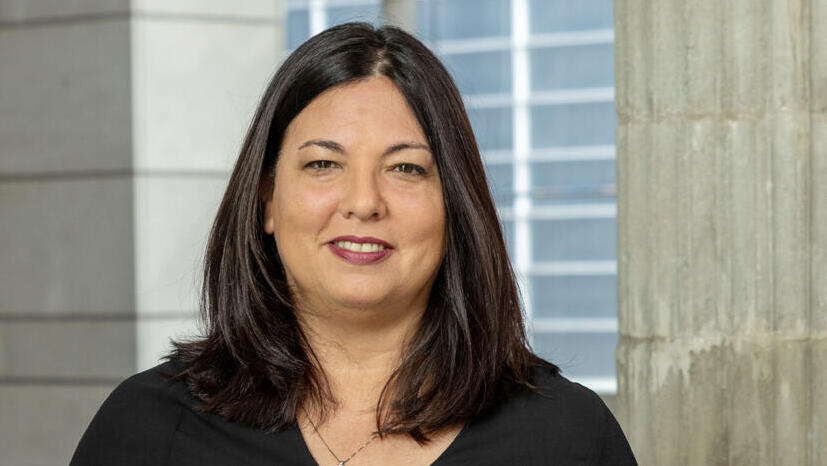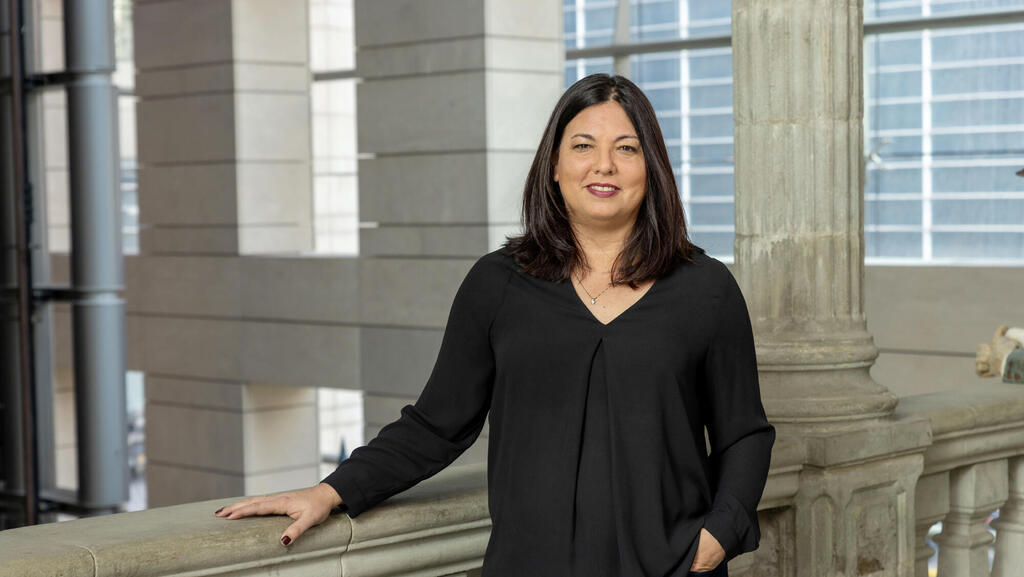
“High-tech is the engine of the Israeli economy and the banks must be there”
In an exclusive interview with Calcalist, LeumiTech CEO Timor Arbel-Sadras talks fundraising, credit, Ukraine, and what’s in store for 2022
"Last year, investors entered the high-tech market that were not there before. They came with huge sums of money and took the market to really unhealthy places,” Timor Arbel-Sadras, CEO of LeumiTech, told Calcalist in an exclusive interview. “There have been some really shocking cases with absurd values for high-tech companies."
Arbel-Sadras took up her position at the beginning of the year after replacing LeumiTech’s first, and dominant, CEO, Yifat Oron, who served in the position since 2014 and built up the bank's brand in the high-tech industry. Arbel-Sadras came to LeumiTech after a period of 14 years at Viola Credit, including six years of managing the fund. Viola Credit, like LeumiTech, specializes in providing credit to high-tech companies. Prior to her transition to LeumiTech, Arbel-Sadras served as Chief Operating Officer (COO) of EverC, an Israeli fintech startup that is involved in risk management.
Related articles:
The Israeli high-tech industry in 2021 was at its peak with over $25 billion in capital raising. Looking back, how do you see 2021?
“It was a very exciting year because it was the antithesis of everyone's concerns about how the Covid-19 virus would stop everything. The market feared that it might be like the crisis of 2008 or like the bubble of 2001, but the reality was different. It was very exciting because in the end there was a real change in the world. The whole digitization story that has spread to new population groups has brought with it a lot of indirect changes. It is not only digitization, but also work from home, cyber dangers and e-commerce that have undergone a very rapid change. There were many Israeli companies that were ready at the same time. It was a combination of common sense and luck to ride this wave and they made an operational business leap. LeumiTech, which analyzes the companies' activities, also sees a jump in sales, and reacts very quickly to changes in the market. Things ran at a hysterical pace but there were also reactions and effects that were really crazy. We saw company values in amounts that were astounding, some of which were very financially correct and some were exaggerated. There are not many periods like 2021 and we must catch them when they come around."
What do you think about the distribution of fundraising between large and small companies?
"There were headlines about companies raising a lot of money but in young companies it was not easy to raise funds and things there did not change. Most of the money was raised for older companies. The money was not spread over more companies, most of the money was given to fewer mature companies. There have been some crazy seed round recruitments, but those exceptions are not the rule."
According to Arbel-Sadras, "there is something that has not changed and that is the amount of money in the funds. They need to invest and provide returns. I believe we will see a separation between companies that it’s easy for them to fundraise and companies that will have to deal with the impact of the markets. The private market takes time to react for better or worse, we should watch out for and make sure the pendulum will not be too strong. Anyone who does not fundraise at a higher value next time, will run into a serious problem with his employees. This is a business opportunity for us, because we give financing to companies without harming the company's value."
How do you see 2022?
"In 2022, I expect that part of the decline in the value of public companies on U.S. stock exchanges will also happen to private companies in Israel. This year we will see strong funding rounds in the good companies. It’s hard for me to say what their value will be. This year companies and investors will also start looking at business data. In the end, the good companies are the ones that create more value than the value of the money thanks to the management. Mostly I wish they would conquer the next summit, but also look for a path to profitability. We saw 40 acquisitions of Israeli companies in 2021, and I think we’ll see more acquisitions in 2022."
According to Arbel-Sadras, "companies will add sanity into their spending structure. Companies that see the ability to make business leaps by putting their foot on the gas pedal will do so. To run you need workers, and there will be gaps due to the high demand and low supply of workers. In 2021, young companies realized that they can be big and that's how they build themselves. CFOs know that alongside raising capital in equity, they can raise financing for growth through credit."
How many companies use the credit tool?
"In every round of recruitment today, management and the board talk about the use of credit and not just raising capital. In the past there was a problem of knowledge in the field but today the number of VPs who know how to take credit has increased significantly. Today, about a quarter of the growth companies use credit as a tool to finance current operations. I estimate that today about 20% of the rounds of funding included such a percentage of credit. Credit is taken to buy time and this is related to the level of monthly expenses. You do not just take credit, only credit that gives you business value."
Isn’t it difficult for the bank to give credit to a company that finds it hard to provide suitable collateral?
"Yes, it is still very challenging to give credit to a company that is a “loser” by definition. It requires a great deal of expertise and a different analytical ability than when considering providing credit to a stable industrial company. That's why Leumi decided to set up a unit that all it does is high-tech and is in an intimate relationship with and knows the investors. High-tech is the engine of the Israeli economy and the banks must be there."
Do you think the current war in Ukraine will have an impact on local high-tech?
"In recent years, Israeli high-tech companies have opened a significant number of centers of activity abroad, including in Ukraine - a trend that intensified during the Corona period. There are mainly development, operation and customer support teams. The connection between the Israeli companies and the professionals in Ukraine is so successful not only because of the lack of time difference and the appropriate level of education of the workers, but mainly because of the people themselves, who are characterized by creativity and ambition. It is clear that the war requires an immediate response from Israeli companies: both to reduce harm to activity and development, and as a result of human and managerial responsibility to their colleagues and employees. I see how one Israeli company after another mobilizes in an amazing way to take care of their coworkers in the Ukraine. Managements are implementing the same determination, creativity and quick response that has led them to business success, in finding solutions for their colleagues overseas. They also invest considerable resources in this. I also estimate that the trend of developing activity abroad will not stop. Building companies as global companies from the starting point and financially efficient planning over time - it’s a statement that ‘we're here to stay’."
There is a lot of talk about diversity and especially about the issue of integrating women in high-tech, but an examination of the data shows that there has been almost no change over the years. How do you see it?
"I am very disturbed by the integration of women in high-tech in Israel, starting in the earliest stages, such as elective classes in mathematics and robotics," said Arbel-Sadras, who will be participating in Calcalist's Mind the Tech conference in London next week. "The industry in Israel is a swamp where everyone knows everyone and the story of the networks is very strong. Women need to know how to invest in networking and relationships and also promotion to move forward. There is no real reason why women should not make up 50% of the entrepreneurs or investors.
"In general, in the Israeli high-tech industry there are too few women in key positions. In this field we are not progressing at a reasonable pace and that means that in practice we are going backwards. Our role as managers is to be active in creating change. That is, to use our ability to influence to prevent built-in discrimination on the one hand, and on the other hand to encourage young women to seize opportunities and even create them. Gender diversity, personal and professional background, different opinions - produce a winning performance. As a CEO, I really make sure of this. At LeumiTech, we have at least gender equality in every cross-section of a group of employees and special attention is paid to preventing gender pay gaps."
